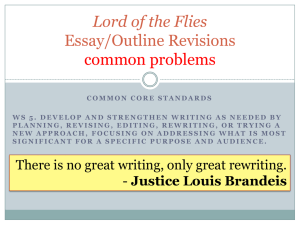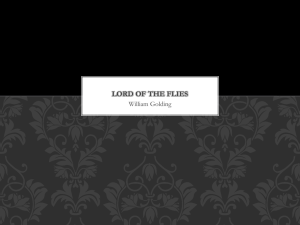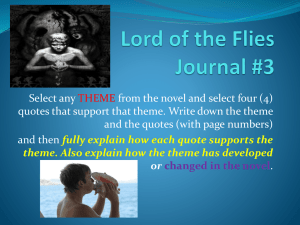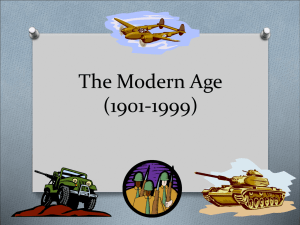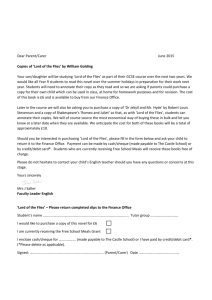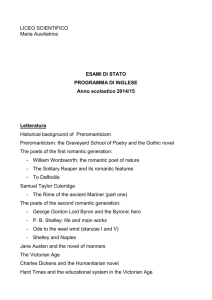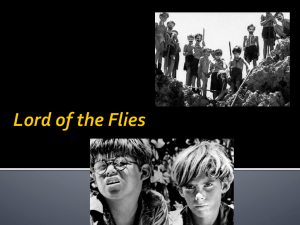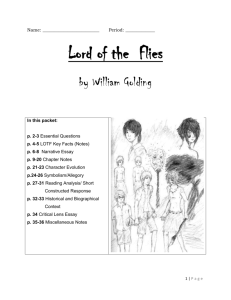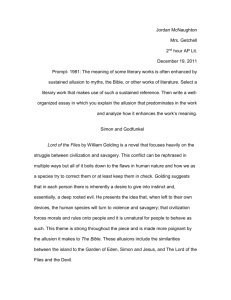English Language Arts
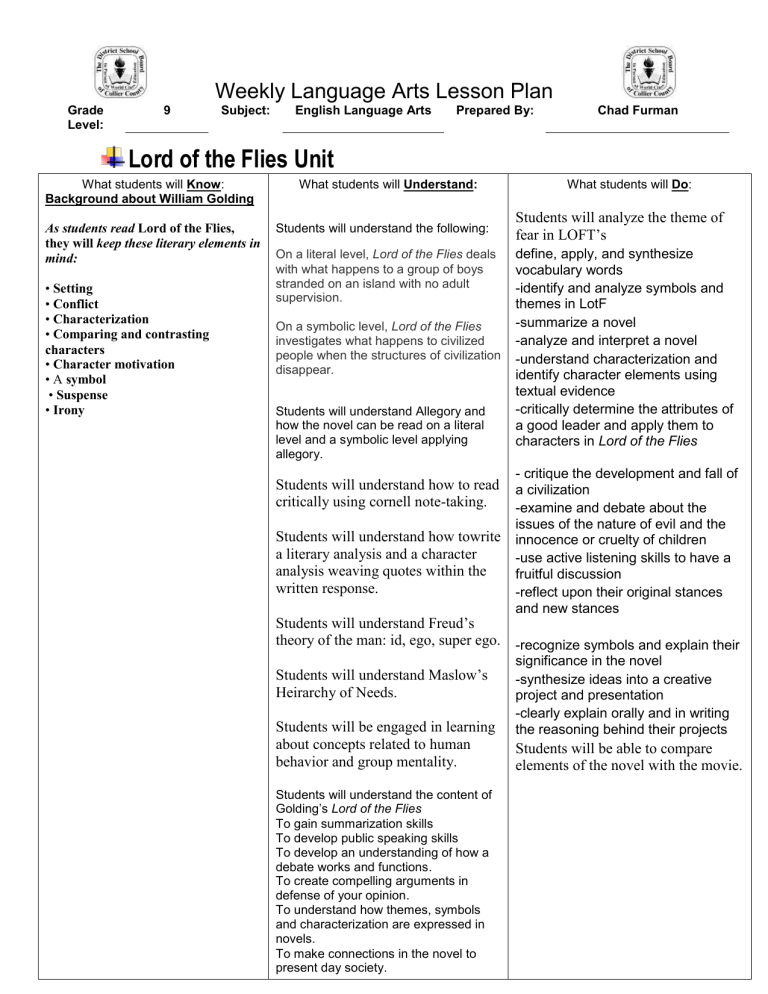
Grade
Level:
9
Weekly Language Arts Lesson Plan
Subject: English Language Arts Prepared By:
Lord of the Flies Unit
What students will Know :
Background about William Golding
As students read Lord of the Flies, they will keep these literary elements in mind:
•
Setting
• Conflict
• Characterization
• Comparing and contrasting characters
• Character motivation
• A symbol
•
Suspense
•
Irony
What students will Understand:
Students will understand the following:
On a literal level, Lord of the Flies deals with what happens to a group of boys stranded on an island with no adult supervision.
On a symbolic level, Lord of the Flies investigates what happens to civilized people when the structures of civilization disappear.
Students will understand Allegory and how the novel can be read on a literal level and a symbolic level applying allegory.
Students will understand how to read critically using cornell note-taking.
Students will understand how towrite a literary analysis and a character analysis weaving quotes within the written response.
Students will understand Freud’s theory of the man: id, ego, super ego.
Students will understand Maslow’s
Heirarchy of Needs.
Students will be engaged in learning about concepts related to human behavior and group mentality.
Students will understand the content of
Golding’s Lord of the Flies
To gain summarization skills
To develop public speaking skills
To develop an understanding of how a debate works and functions.
To create compelling arguments in defense of your opinion.
To understand how themes, symbols and characterization are expressed in novels.
To make connections in the novel to present day society.
Chad Furman
What students will Do :
Students will analyze the theme of fear in LOFT’s define, apply, and synthesize vocabulary words
-identify and analyze symbols and themes in LotF
-summarize a novel
-analyze and interpret a novel
-understand characterization and identify character elements using textual evidence
-critically determine the attributes of a good leader and apply them to characters in Lord of the Flies
- critique the development and fall of a civilization
-examine and debate about the issues of the nature of evil and the innocence or cruelty of children
-use active listening skills to have a fruitful discussion
-reflect upon their original stances and new stances
-recognize symbols and explain their significance in the novel
-synthesize ideas into a creative project and presentation
-clearly explain orally and in writing the reasoning behind their projects
Students will be able to compare elements of the novel with the movie.
Weekly Language Arts Lesson Plan
Predominant Language Arts Benchmarks Addressed :
Grade level: 9-12
Subject area: language arts
Standard:
Demonstrates competence in the general skills and strategies for reading a variety of literary texts.
Benchmarks:
Understands the effects of complex literary devices and techniques on the overall quality of a work (e.g., tone, irony, mood, figurative language, allusion, diction, dialogue, symbolism, point of view, style).
Grade level: 9-12
Subject area: language arts
Standard:
Demonstrates competence in the general skills and strategies of the reading process.
Benchmarks:
Identifies and analyzes the philosophical assumptions and basic beliefs underlying an author's work.
English Language Arts
Standard 1: Language for Information and Understanding
Students will listen, speak, read, and write for information and understanding. As listeners and readers, students will collect data, facts, and ideas; discover relationships, concepts, and generalizations; and use knowledge generated from oral, written, and electronically produced texts. As speakers and writers, they will use oral and written language that follows the accepted conventions of the English language to acquire, interpret, apply, and transmit information.
Standard 2: Language for Literary Response and Expression
Students will read and listen to oral, written, and electronically produced texts and performances from American and world literature; relate texts and performances to their own lives; and develop an understanding of the diverse social, historical, and cultural dimensions the texts and performances represent. As speakers and writers, students will use oral and written language that follows the accepted conventions of the English language for self-expression and artistic creation.
Standard 3: Language for Critical Analysis and Evaluation
Students will listen, speak, read, and write for critical analysis and evaluation. As listeners and readers, students will analyze experiences, ideas, information, and issues presented by others using a variety of established criteria.
As speakers and writers, they will use oral and written language that follows the accepted conventions of the
English language to present, from a variety of perspectives, their opinions and judgments on experiences, ideas, information and issues.
Standard 4: Language for Social Interaction
Students will listen, speak, read, and write for social interaction. Students will use oral and written language that
Weekly Language Arts Lesson Plan follows the accepted conventions of the English language for effective social communication with a wide variety of people. As readers and listeners, they will use the social communications of others to enrich their understanding of people and their views.
Weekly Language Arts Lesson Plan
Essential Question:
Essential Questions:
Although we may disagree with some, why are rules imperative to the survival of a society?
Is humankind inherently good or evil? * Think about the fact that people often disagree about our true human nature —Why?
What is the function of human will in the relationship between good and evil?
How does Golding use setting and characters in Lord of the Flies to express his personal or political beliefs?
What is the importance of civilization and what factors support or destroy its fabric?
How do the decisions and actions of characters reveal their personalities?
1.
What makes an individual powerful?
Materials Needed
(Highlight One or
More)
Paper
Pen/Pencil
Computer/Laptop
Highlighters
Manipulatives
Novel/Text/Textbook
Other:
2.
How does individual power change in relationships with others?
3.
Do individuals control groups, or do groups control individuals?
4.
How does a society maintain order? Are laws necessary?
5.
How do fear and desire for acceptance influence human behavior?
6.
What are the implications for contemporary society?
7.
Does violence create power or control?
8.
How is the idea of freedom seen in the book? How is repression seen in the book?
9. How do societies affect individual freedoms?
10.
How is communication seen in the book? Why is this communication, or the lack thereof, important to the novel?
11.
What causes people to rise up and rebel?
12.
What prevailing conditions cause revolt?
13.
What is the nature of power and how do people get it, take and use or abuse it?
14.
What are the qualities of a good leader?
15.
How are these themes seen in a modern issue?
Weekly Language Arts Lesson Plan
Planned Instructional Questions During Lesson:
Creating:
Students will critique and discuss the motivations behind major actions the characters produced.
Students will create a debate from their literary analysis paper.
Evaluating: Students will evaluate other teams debates over who is the better leader, Ralph or Jack? Should the boys be charged with the murder of Simon and Piggy on the island?
Analyzing:
Students will pick a character in the book and compare and contrast yourself to this character.
Applying:
Students will create a symbol that represents each of the characters in the novel.
What would you do/what steps would you take if you were stranded on an island?
Understanding: Students will understand how to write an effective literary analysis and how ot debate.
Remembering:
How does society make us better people?
How do the character’s personalities relate to the background of the novel?
What is a symbol and what is a theme? How can we find them in literature?
Do you believe you are the way you are because of your nature or nurture?
Weekly Language Arts Lesson Plan
Assessments/Surveys:
(Steps to check for student understanding – before and after instruction )
Before: Previewing the text and Chapter Titles
Formative: The instructor will informally assess students during independent, paired, and group work.
Student presentations and essays will be graded according to criteria based on holistic rubrics. LOTF worksheets, pop quizzes, and final examinations will be graded with letter grades and/or points.
Closure:(Summative) Unit Reflection
Students will reflect on how the story affected their perspective about humankind and they will share their thoughts about what they would have done differently if they were part of the group on the island.
Instructional Strategies/Activities:
Questions: How do you determine what makes up a good leader?
What is evil? Can you provide some examples of things/actions that are evil? Are we born evil or is it learned?
ELL/ESE Strategies
(Highlight One or
More):
Computer-Assisted Inst.
Multisensory Approach
Peer/Adult Tutoring
Cooperative Learning
Think-Aloud
Visual Aids
Inquiry Approach
Key Words/Vocab.
Storytelling
Music/Videos
Lesson #1: Survival
Lesson #2: A Look at our Society
Lesson #3: Content Test and Assignment Details
Lesson #4: Looking at People
Lesson #5: Working on Assignment
Lesson #6: Themes (Good vs. Evil and Civilization vs. Savagery)
Lesson #7: Symbolism in our Lives
Lesson #8: Arguments for Debate
Lesson #9: Work Period
Lesson #10: The Debate
Lesson #11: "Perfect World" Presentations http://furman.weebly.com/lord-of-the-flies.html
